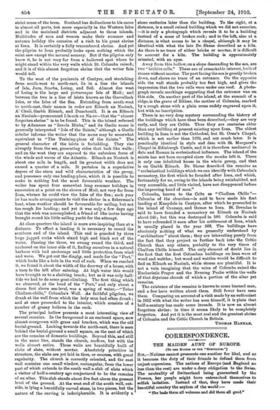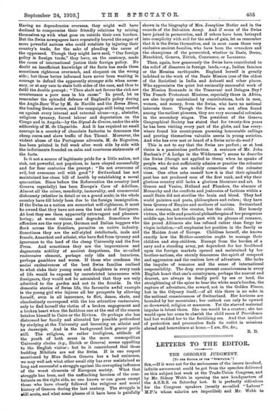CORRESPONDENCE.
THE MAIDEN AUNT OF EUROPE. rue TSB ED/TOIL or TM ."arxemvoz."] SIR,—Nations cannot prosecute one another for libel, and so it becomes the duty of their friends to defend them from unjust aspersions. The nations of Europe (and England no less than the rest) are under a deep obligation to the Swiss. The neutrality of Switzerland being guaranteed by the Powers, her people might have entrenched themselves in selfish isolation. Instead of that, they have made their beautiful country the asylum of the world a-
" She bade them all welcome and did them ail good."
Having no dependencies overseas, they might well have declined to compromise their friendly relations by mixing themselves up with what goes on outside their own borders. But the Swiss newspapers have repeatedly braved the anger of more powerful nations who could retaliate by injuring their country's trade, for the sake of pleading the cause of the oppressed. Though they might have said, " Our foreign policy is foreign trade," they have, on the contrary, made the cause of international justice their foreign policy. No doubt an insufficient knowledge of the facts has made them sometimes righteous overmuch, and eloquent on the wrong side ; but those better informed have never been wanting in courage to defend the apparently stronger side when neces- sary, or at any rate to state both sides of the case, and thus to fulfil the double precept : " Thou shalt not favour the rich nor countenance a poor man in his cause." In proof, let us remember the splendid defence of England's policy during the Anglo-Boer War by M. de Neville and the Revue Bleue, the leading Swiss review, and the campaign still being carried on against every internal and external abuse—e.g., absinthe, religious tyranny, forced labour and deportation on the Congo and in Angola—by the Signal de Geneve, under the able editorship of M. de Claparede. And it has required no small courage in a country of chocolate factories to denounce the cheap cocoa and slave traffic of San Thome. Moreover, the violent abuse of the Portuguese advocate, M. de Negreiros, has been printed in full week after week side by side with the indictments founded on calm and courteous statements of the facts.
Is it not a source of legitimate pride for a little nation, not rich, not powerful, not populous, to have obeyed successfully and for four centuries the precept:. "Be not overcome of evil, but overcome evil with good " ? Switzerland has not maintained her clean bill of health by establishing a moral quarantine. Since before the Reformation the country (and Geneva especially) has been Europe's Cave of Adullam. Almost all the crime, mendicity, immorality, and commercial dishonesty (whether in detail or on a grand scale) in the whole country have till lately been due to the foreign immigration. If the Swiss as a nation are somewhat self-righteous, it must be owned that they have not seen the best side of foreigners. At best they see them apparently extravagant and pleasure- loving; at worst vicious and degraded. Sometimes the offenders are the very poor, German and Italian beggars who flock across the frontiers, parasites on native industry. Sometimes they are the self-styled intellecluels, male and female, Anarchist and atheist, who have fled from tyranny and ignorance to the land of the cheap University and the free Press. And sometimes they are the impecunious and degenerate nobility of ancient despotisms, the so-called rastacouere element, perhaps only idle and luxurious, perhaps gamblers and worse. If those who condemn the social exclusiveness of the best Swiss families realised to what risks their young sons and daughters in every rank of life would be exposed by unrestricted intercourse with foreigners, they would not be astonished that they are only admitted to the garden and not to the fireside. In the domestics stories of Swiss life, the favourite awful example is the young girl who injures all her prospects by allowing herself, even in all innocence, to flirt, dance, skate, and clandestinely correspond with the too attractive rastacouere, only to find herself the victim of a broken engagement and a broken heart when the faithless one at the end of the season betakes himself to Cairo or the Riviera. Or perhaps she has distressed her family and alienated her possible prelendant by studying at the University and becoming an atheist and an entancipee. And in the background lurk graver perils still. The religious, or rather irreligious, attitude of the youth of both sexes in the more cosmopolitan University circles (e.g., Zurich or Geneva) seems appalling to the English visitor : but be it remembered that these budding Nihilists are not the Swiss. If in one respect mentioned by Miss Sellers Geneva has a bad eminence, we may well ask what other small city has ever maintained so long and successful a struggle against the corrupting influence of the worst elements of European society. What that struggle has been, and the unflinching heroism of the com- batants on the right side, no one knows or can guess except those who have closely followed the religious and moral history of Geneva during the last century. The struggle is still acute, and what some phases of it have been is painfully
shown in the biography of Mrs. Josephine Butler and in the records of the Salvation Army. And if some of the Swiss have joined in persecution, and if others have been betrayed into complicity with evil for the sake of gain, let us remember that it is the Swiss themselves, and in most cases those very exclusive ancient families, who have been the crusaders and the champions of the persecuted, whether in Basle, Berne, Neuchatel, Geneva, Zurich, Constance, or Lausanne.
Then, again, how generously the Swiss have contributed to the relief of disasters in foreign lands,—e.g., Indian famines or the Messina earthquake. England herself is greatly indebted to the work of the Basle Mission (one of the oldest of the Societies) in India and Ashanti and other places. Who appreciates the quiet but eminently successful work of the Mission Romande in the Transvaal and Delagoa Bay ? The French Protestant Missions, especially those in Africa, are also largely maintained by contributions, both in men, women, and money, from the Swiss, who have no national interests there. Though the Swiss are not often found among the earliest pioneers, they are very successful colonists in the secondary stages. The president of the Geneva Geographical Society has stated that for twenty-five years he has been visiting every part of the globe, and has every- where found his countrymen pursuing honourable callings and proving themselves valuable assets in young societies. And who has ever met or heard of a Swiss ne'er-do-weel P
This is not to say that the Swiss are perfect ; or at best theirs is a passionless perfection. A sentence of Mr. John Buchan's (" A Lodge in the Wilderness ") seems to describe the Swiss (though not applied to them) when he speaks of people who do not sufficiently admire or practise the robuster virtues, and who are unduly censorious of the robuster vices. One often asks oneself how it is that their splendid past has not produced men of the first rank, and why their glorious country still lacks a glorious literature and art. In Greece and Venice, Holland and Flanders, the absence of Monarchy and the conflicts and jealousies of factions within a small State did not sterilise the brain and blood. They had world painters and poets, philosophers and rulers ; they have been Queens of Empire and mothers of nations. Switzerland alone remains, not the creator, but the critic. Her homely virtues, the wide and practical philanthropies of her prosperous middle age, her honourable past with its gleams of romance, the proud Alliances she has refused rather than forgo her virgin isolation,—all emphasise her position in the family as the Maiden Aunt of Europe. Childless herself, she knows exactly how the Mother-countries ought to manage their children and step-children. Exempt from the burden of a navy and a standing army, yet dependent for her livelihood upon the foreign markets opened and maintained by her
brother-nations, she sternly denounces the spirit of conquest and aggression and the restless love of adventure. She lacks the impulse of romance and the sense of international responsibility. The deep ever-present consciousness in every English heart that one's countrymen, perhaps the nearest and
dearest, are always in deadly peril by sea or land, the straightening of the spine to bear the white man's burden, the rapture of adventure, the reward, not in the Golden Fleece, but in the Odyssey itself,—of all this there is no echo in the national consciousness of Switzerland. Her horizons are bounded by her mountains ; her outlook can only be upward or downward, religion or mammon. Yet the starved maternal impulse is latent there. She too would be a creator; she too would open her arms to cherish the child races if Providence had but wedded her to the fertilising sea. And that instinct of protection and procreation finds its outlet in missions abroad and benevolence at home.—I am, Sir, &c.,
R. B.











































 Previous page
Previous page